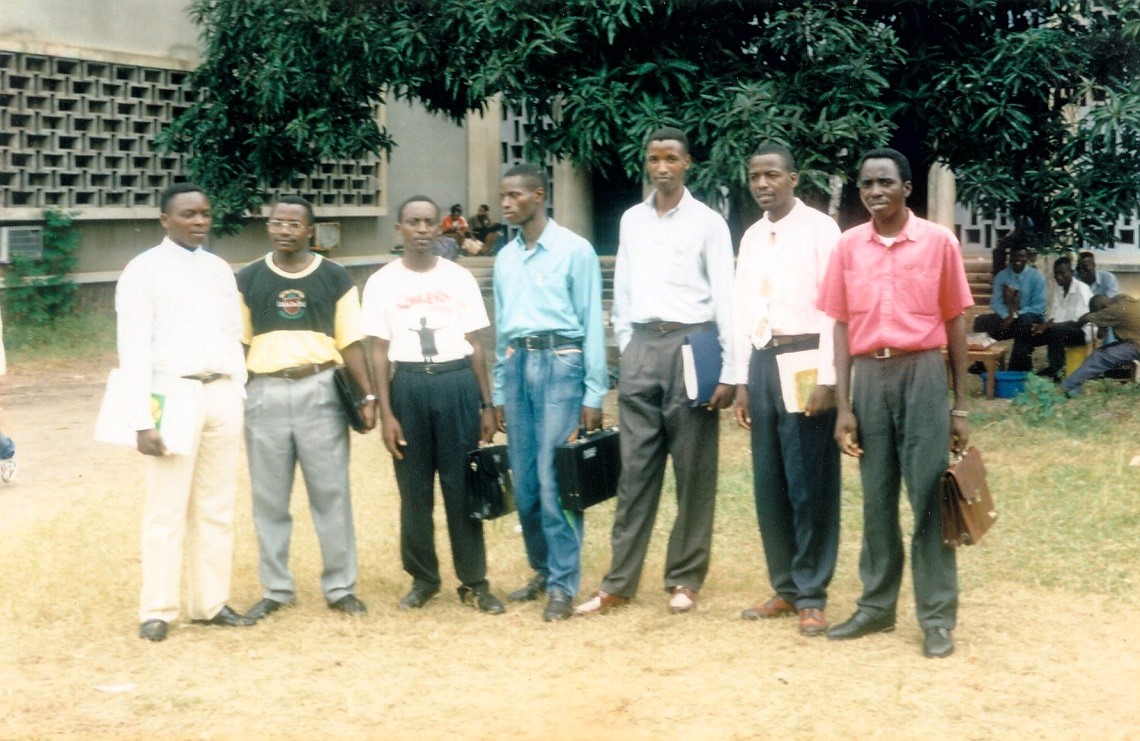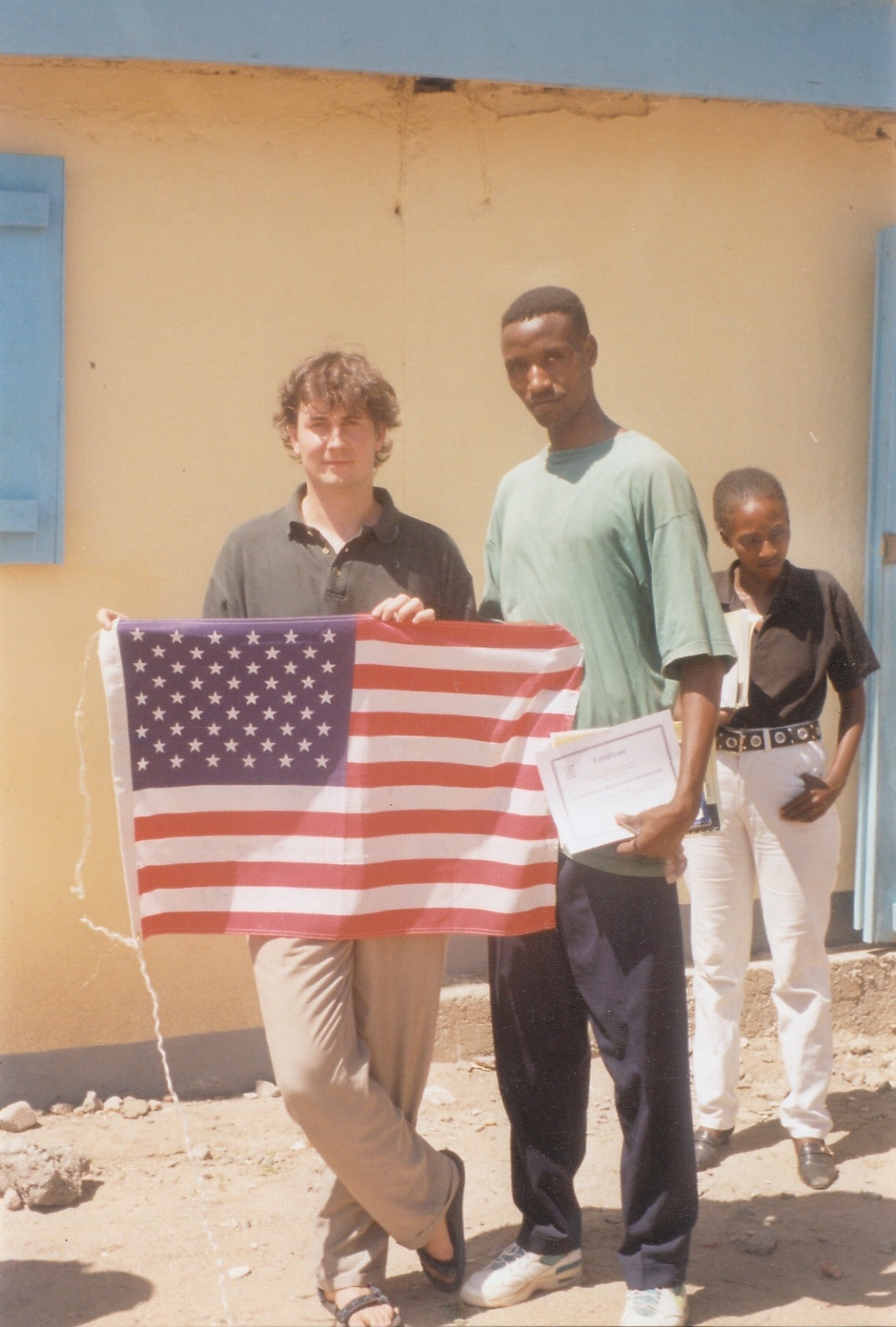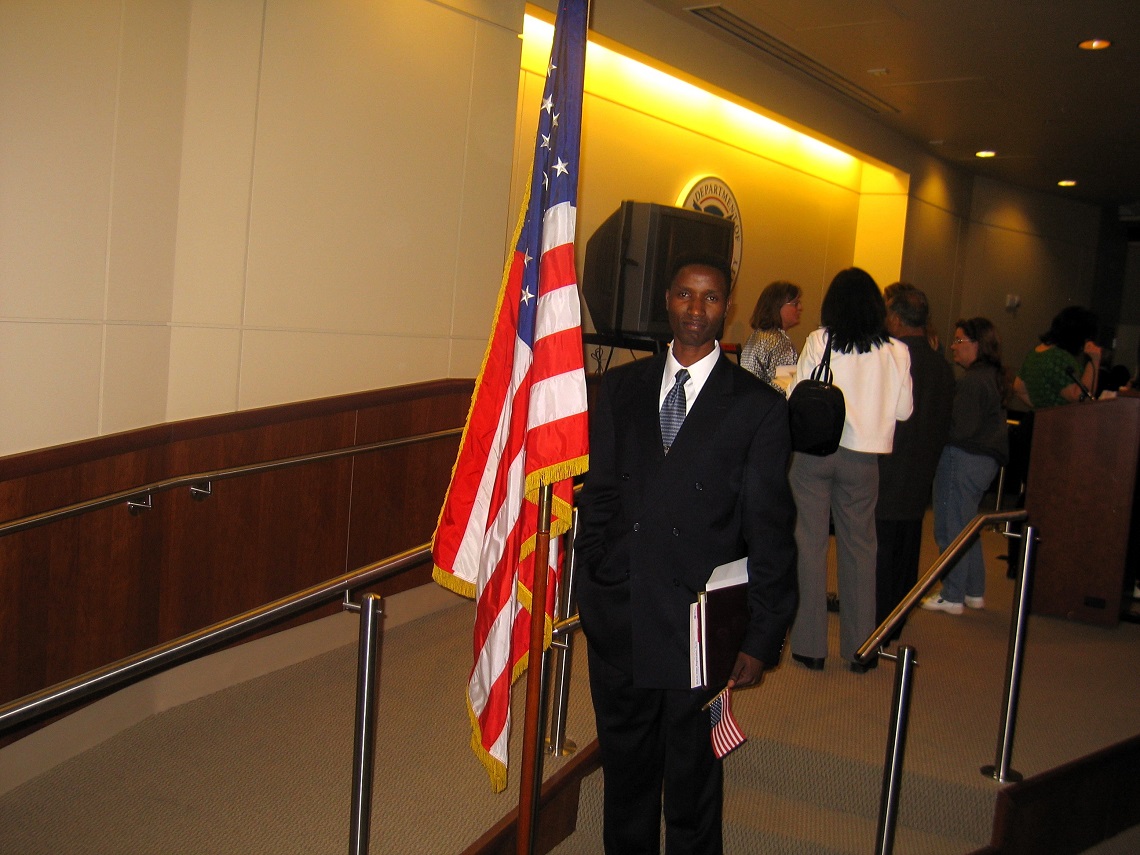Out of Africa
His Foster School experience enabled Jean-Paul Sebagarambyi to turn a Congolese nightmare into an American dream
Jean-Paul Sebagarambyi (BA 2007) is tall and slim, with sculpted features and a proud, solemn bearing that lends him an air of nobility, tinged with melancholy.
It’s only a hint of sorrow, the slightest intimation of a personal history scarred by tragic loss and unthinkable moral quandary. But that mournful past is very real, very raw, and indelibly etched into his very being.
Sebagarambyi is a Hutu. He was born in 1968 in the village of Bunagana in the eastern part of the Democratic Republic of the Congo, just across the border from Rwanda. He was the youngest child in a family of eight. As a boy, he farmed with his father and fetched the family’s daily water in five gallon jugs from five miles away.
A few years after completing high school, Sebagarambyi traveled across the Congo to study economics at the University of Kinshasa, in the nation’s capital. He hoped to graduate by the mid-1990s. That was before the wars.
The end of innocence
Modern troubles in the Congo region began with the 1994 Rwandan Genocide. For several months following the assassination of the nation’s Hutu president, paramilitary gangs of ethnic Hutus slaughtered some 800,000 rival Tutsis and moderate Hutus. After a Tutsi-led regime regained control of Rwanda’s government and military, millions of Hutus fled to the Congo fearing reprisal. Many landed in the border region where Sebagarambyi’s family lived.

In 1996 Laurent Kabila, a Congolese general backed by Tutsi forces from Rwanda and Uganda, launched a rebellion against Congolese president Mobutu Sese Seko. In the capital, the university closed and Sebagarambyi, a peaceable man, went into hiding.
His family had no such luck. As the invasion poured over the Congo’s eastern border, rogue Tutsi armies attacked any Hutus they could find—whether they were innocent or guilty of the atrocities in Rwanda. On October 30, after a failed attempt to escape into the bush by night, Sebagarambyi’s father, mother, brother, sister-in-law and their three children were murdered together in a house on the outskirts of their village.
“They shut the door and tried to keep quiet,” he says. “But my brother had a baby, and the baby cried. They killed everyone in there.”
Hundreds of thousands of Hutus were killed in this counter-genocide, though it was never labeled as such by the international press. The bloodshed barely registered a headline in Europe or North America.
Sebagarambyi was devastated. But he had little time to grieve. A second Congo War, later known as the African World War, began in 1998, when Kabila ordered the Tutsi forces that had helped him gain power to leave the Democratic Republic of the Congo. Instead, they mounted a bloody coup d’état.
In Kinshasa, the Congolese army was ordered to shoot enemy Tutsis on sight.
Though Sebagarambyi is Hutu, born in the Congo, his lank frame and angular features led many in the fearful capital to mistake him for a Tutsi. Now he was afraid. He returned to hiding. But one day a woman saw him and screamed, “Rwandans are still in this city!”
Fortunate to only be arrested, Sebagarambyi was eventually released after proving his citizenship and ethnicity. His life was spared. But the psychological scars were deep and indelible. “First I lost my family to Tutsi rebels,” he says. “Then in Kinshasa people assumed that I was a Tutsi and wanted to kill me. I was a double victim.”
The hardest decision
No matter which side prevailed in this war, Sebagarambyi knew that it was no longer safe for him to remain in his homeland. “It looked as if I didn’t have a future in this country anymore,” he says, sadly.
With nowhere else to go, he checked into a United Nations refugee camp in sweltering Cameroon for eight months. When applying for a refugee visa, a US immigration officer asked what he—a Congolese Hutu—was doing in a camp primarily for Tutsis. “I said, ‘Look at me, my morphology, my name, where I come from. Tell me, how can I survive in Kinshasa?’”

The woman took pity. On August 15, 2000, Jean-Paul Sebagarambyi boarded a plane bound for New York City.
“Imagine traveling by yourself, leaving your family and friends behind, just boarding a plane to a place where you don’t know anyone, you have no money and you don’t even speak the language very well. It was a big adventure. I landed at JFK, and I was in America…”
“Bring me your tired…”
Sebagarambyi was met, upon landing, by a representative from Catholic Community Services refugee settlement program. The woman set him up in a small apartment in Elizabeth, New Jersey, bought him a few bags of groceries, helped him obtain ID cards and secured him a job lifting crates at an egg processing plant. “After that, you are on your own,” he says, in the softspoken manner of one who speaks English as a second—or in his case, fifth—language. “It is not easy. I realized that, in America, when you don’t speak English that well, people think you don’t know anything.”
He was a quick study, though. After a few months schlepping egg crates and doing temp work, fall turned to winter. And winter in New Jersey meant snow. “I had never seen anything so white,” he says. “My impression was that it was nice to look at, but only behind a window.”
Feeling lonely, professionally stifled and cold, Sebagarambyi took an Amtrak train to Seattle, where a university friend had settled. A month later, he landed a job as a housekeeper at the SeaTac Hilton, and moved into his own studio apartment in a public housing high rise on Seattle’s First Hill.

For the first time since beginning his university studies so many years before, Sebagarambyi was able to rekindle his ambition. At the Hilton, he was promoted to concierge. Determined to restart his academic studies, he tested into Seattle Central Community College and earned a 3.8 GPA. He transferred to the University of Washington in 2004. When it was time to choose his field of study, he took inspiration from his day job. “When I would ask the travelers, ‘What brings you to Seattle?’ it was usually business,” he says. “I thought I need to get into a good job fast, so I will study business.”
Back to business
Sebagarambyi was accepted into the Foster School and began studies in finance and international business. Already pushing his late 30s, it felt strange to be sitting in class with kids from another generation and with life experiences that were utterly foreign to him.
But he engaged himself in as many activities as his rigorous schedule would allow. He studied hard and made friends. And last year he won an internship with Amazon, working in finance for the online superstore’s European Union operations department.
“That was my first corporate experience,” he says. “When I first saw it advertised, financial analyst intern, I thought, ‘Wow, this is big for me.’ Imagine going from the jungle to a corporate office. It’s a long distance.”
Working two jobs while attending school full-time was a major challenge. But Sebagarambyi still managed to graduate in 2007, and soon after began work in the finance department of Chevron in the Bay Area.
By now, major transitions are old hat to Sebagarambyi, and he’s excited and a little awed to be working for a multinational corporation. But he also misses the friends he made, especially the fellow Foster School students who interned with him at Amazon—Bao Li, Marina Pai and Hanifa Rafiq—as well as finance classmate Collin Chapman and his many colleagues at the Hilton.
“The workplace, that’s family to me,” he says. “When I go home, I’m alone in my tiny apartment.”
Alone again, or
He hopes it will not be that way for long. In January 2006, Sebagarambyi married Julie Kamikazi, the daughter of family friends. The marriage was arranged, as is common in his country, and performed by proxy. So far, efforts to attain a spousal visa so Kamikazi can join him have been denied by the counselor general at the US Embassy in Nairobi on the grounds that he “sees no relationship.”
But the evidence is written across Sebagarambyi’s face. He has formed a loving bond with Kamikazi during several visits and he calls as often as he can. “Right now phone cards are a big part of my budget,” he says.
In September, violence returned to eastern Congo, and Kamikazi’s family fled Bunagana. Sebaragambyi has petitioned both Washington senators to intervene, and says he will not rest until he has brought his wife to his side.
At peace, at last
Until that day, Sebagarambyi is also pouring himself into his new position with Chevron. Eventually, he hopes to work internationally, noting that Chevron has operations in Africa. If the political climate stabilizes, he’d like to return someday to the Democratic Republic of the Congo. He says his dream job would be working with an organization like the United Nations to reduce poverty and promote peace in his home country and region. “If you have ever been affected by war,” he says, “you realize that it is always a bad thing. In my village, so many innocent people died just like that. Why? Why? If there is a way to avoid it, it’s always better.”

Sebagarambyi finally has options and opportunities. And now that his days are no longer monopolized by two jobs and full-time studies, he has some time to reflect on where he has come from, what he has endured and where he is going. Reflection is not easy. But it is cathartic.
“It is emotional leaving everything and everybody I once knew without an idea of when or whether I’d ever come back,” he says. “But there is also the feeling of joy and gratitude after a long, moral torture. From being labeled with the name of my family’s killers and an enemy in my own country, I have become ‘that guy from Africa.’
“My nightmare has given way to a good dream, the American dream.”
